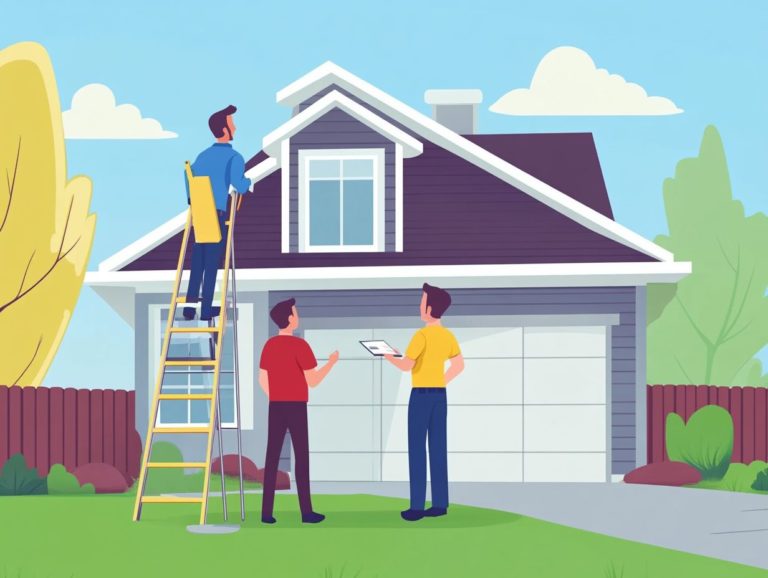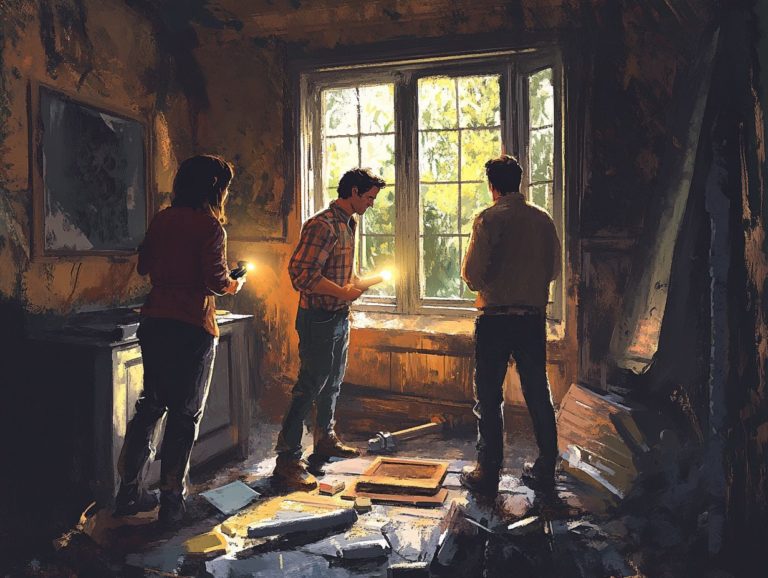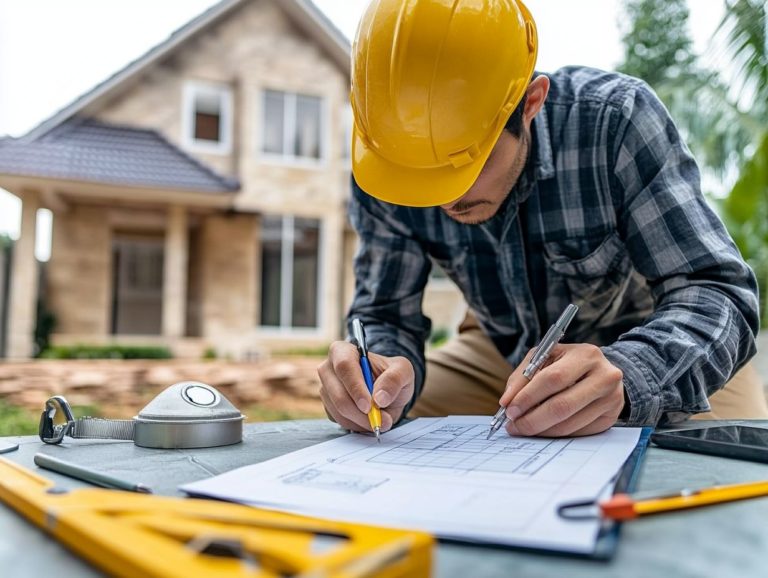How to Choose the Right Inspector for Your Home
Buying a home represents one of the most significant investments you will ever make, and ensuring its condition through a thorough inspection is a must!
This article delves into the importance of home inspections, highlighting their purpose and advantages. You ll discover key qualities to seek in a home inspector, essential questions to pose before hiring one, and the various factors that can influence inspection costs.
We’ll guide you through what to expect during the inspection process and how to interpret the final report. Arm yourself with the knowledge necessary to make informed decisions about your home purchase!
Contents
- Key Takeaways:
- Why a Home Inspection is Important
- Qualities to Look for in a Home Inspector
- Questions to Ask Before Hiring an Inspector
- Factors that Impact the Cost of a Home Inspection
- What to Expect During a Home Inspection
- Interpreting the Inspection Report
- Frequently Asked Questions
- What should I look for in a home inspector?
- How much does a home inspection cost?
- What type of training should a home inspector have?
- Do I need to be present during the home inspection?
- What if the inspector finds problems with the home?
- Can I choose my own home inspector or do I have to use the one recommended by my real estate agent?
Key Takeaways:
Before diving deeper, here are key points to remember:
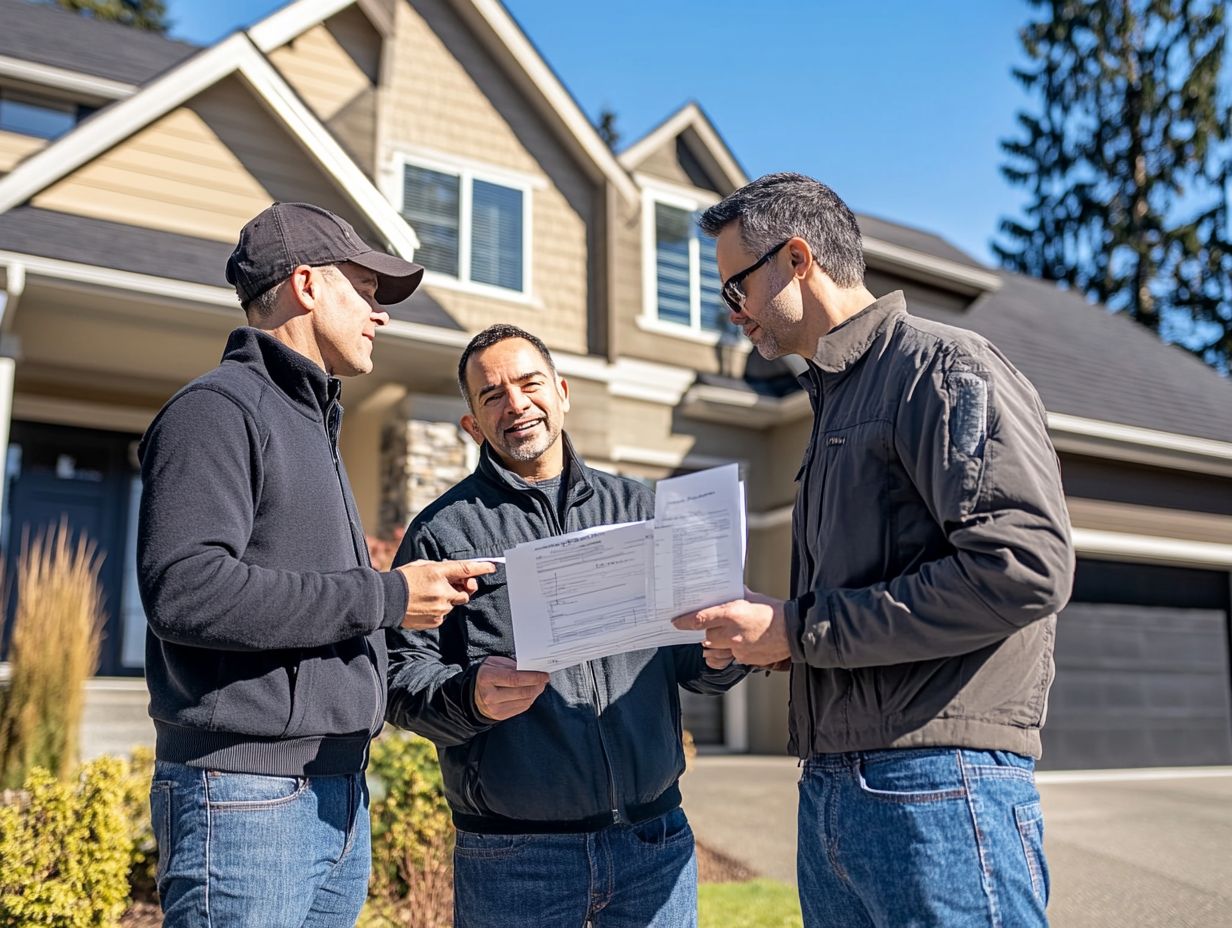
A home inspection is crucial for understanding the condition of a property before purchase or sale. The right home inspector should possess relevant skills and experience, and be able to answer your questions satisfactorily. To ensure you choose wisely, learn how to find reliable home inspection services. Factors such as size, location, and additional services can impact the cost of a home inspection, but it is a worthwhile investment for peace of mind.
Why a Home Inspection is Important
A home inspection is an essential step in your homebuying journey, acting as a safeguard against potential pitfalls like structural issues, mechanical failures, and concealed problems that could lead to substantial financial strain.
Hiring a certified home inspector equips you with a clear understanding of the property’s true condition. To ensure you select the right professional, it’s crucial to know how to compare home inspection services. This insight enables you to make informed decisions based on a thorough inspection report, ensuring that you’re not caught off guard by unexpected surprises down the line.
Understanding the Purpose and Benefits
The primary purpose of a home inspection is to provide you with a thorough understanding of the property you’re considering for purchase. This insight brings numerous benefits that can streamline the transaction and enhance your protection during negotiations.
Identifying potential repair issues early on allows you to make informed decisions about your investment and prioritize necessary fixes. Understanding the condition of essential mechanical systems like plumbing, electrical, and heating, ventilation, and air conditioning (HVAC) can help you avoid unexpected expenses in the future.
You also have the option to conduct additional tests, such as lead or radon assessments, to ensure safety and compliance with health standards. A comprehensive quote from a licensed inspector outlines the extent of needed repairs and enables you in cost negotiations. This fosters greater confidence as you navigate the buying process.
Qualities to Look for in a Home Inspector
When you’re on the hunt for a home inspector, it’s crucial to consider specific qualities that can significantly impact the effectiveness of their inspection services. For more guidance, check out this helpful resource on how to choose the right inspector for your property.
Look for certification and membership in reputable professional associations, such as the American Society of Home Inspectors (ASHI). Ongoing training is another key factor, as it ensures they stay current with industry standards and best practices.
Important Skills and Experience
A qualified home inspector possesses a comprehensive skill set that includes knowledge of various inspection criteria, experience with both mechanical and structural concerns, and the ability to present clear findings through an organized inspection report.
This entails a thorough understanding of electrical systems, plumbing integrity, and potential pest infestations that could jeopardize a property’s value and safety.
For example, a home inspector should be skilled at spotting frayed wires, leaky pipes, and signs of termites or rodents. Articulating these findings in a light yet informative manner is essential; you want buyers to understand the implications of issues like cracked foundations or roof leaks without feeling overwhelmed.
An effective report weaves in visuals and straightforward language, transforming complex technical insights into actionable advice for potential homeowners, enabling them to make informed decisions.
Questions to Ask Before Hiring an Inspector
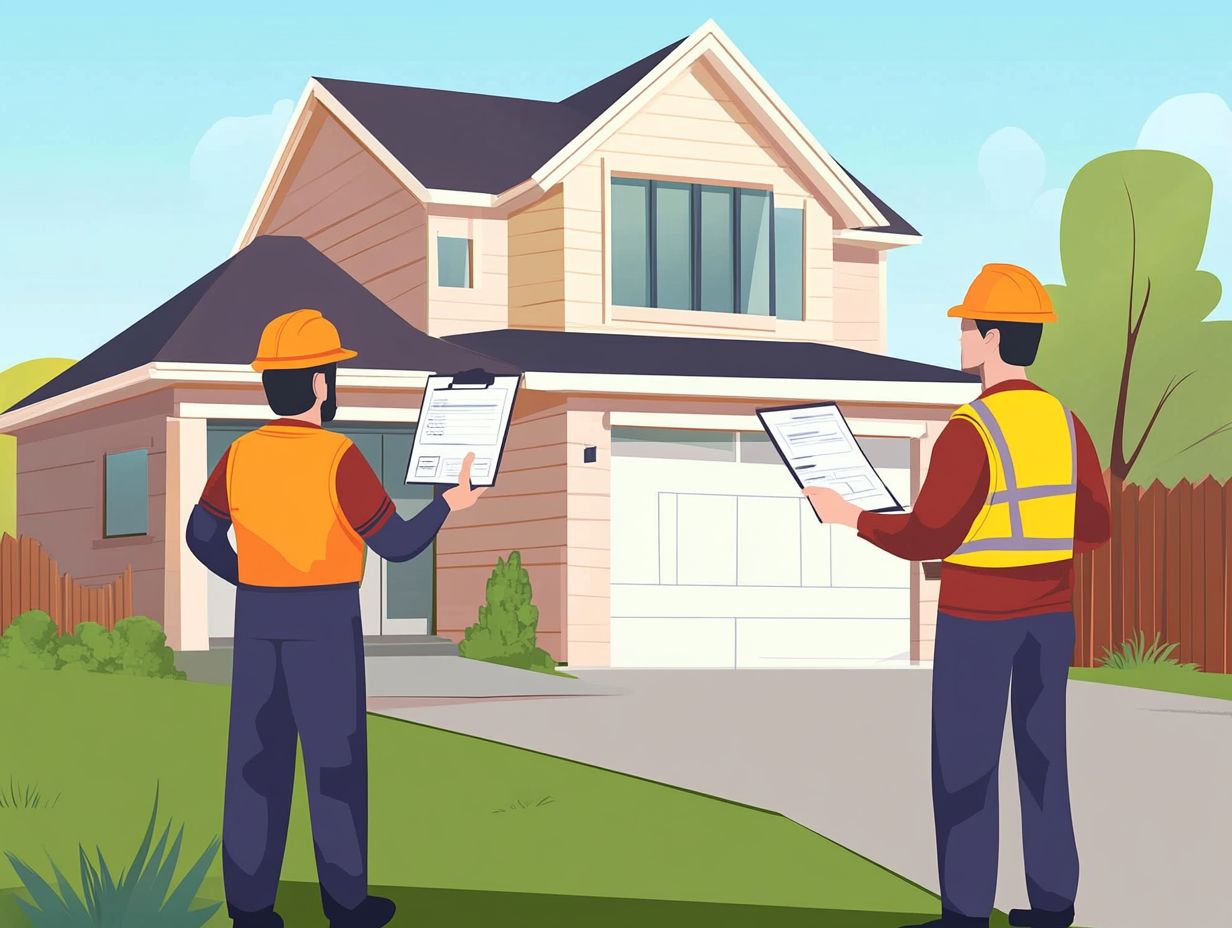
Before you hire a home inspector, it’s essential to ask several key questions to ensure they align with your needs and can deliver a reliable assessment of the property. For detailed guidance, check out this resource on how to select a home inspector for your needs.
Focus on their experience, the comprehensiveness of their inspection report, and whether they carry professional liability insurance to safeguard against any potential risks.
Start your home buying journey today with a trusted inspector by your side!
Key Inquiries for Assessing Suitability
When evaluating a home inspector, ask the right questions. Inquire about their inspection process and costs. Additionally, knowing how to find a qualified home inspector can enhance your understanding of how they use buyer reviews and detailed quotes to aid your negotiation strategies.
It’s vital to know how the inspector approaches different types of properties. Each may present unique challenges that require specific expertise. You should also consider the inspector’s willingness to discuss their findings in detail. Understanding how to spot a good home inspector can provide invaluable insights, enabling you to make informed decisions throughout the purchasing journey.
Grasping the pricing structure is another key element that can impact your negotiations. Transparency fosters trust and gives you leverage in discussions with sellers.
Ultimately, the more informed you are about the inspection process and associated costs, the better positioned you’ll be to advocate for your interests effectively.
Factors that Impact the Cost of a Home Inspection
Numerous factors influence the total cost of a home inspection. These include the property s complexity, the inspector’s qualifications, and any supplementary tests that may be necessary to uncover concealed issues.
This results in a comprehensive quote from a licensed inspector tailored to your situation.
Understanding Pricing and What to Expect
Understanding the pricing structure and what to expect during the home inspection process is essential for you as a buyer. It enables you to negotiate effectively and ensures you receive thorough inspection services that meet your needs.
The costs of home inspections can vary widely based on several factors: the size, location, and age of the property, as well as the inspector s experience and qualifications. Remember that opting for additional services, such as radon testing or mold inspections, can elevate the overall price.
Don’t skip reviewing sample reports it’s a crucial step for your peace of mind! This allows you to gauge the thoroughness and reliability of the inspector, ensuring no detail slips through the cracks. Inspection recommendations can significantly influence your negotiations and provide valuable leverage when discussing repairs or price adjustments with sellers.
What to Expect During a Home Inspection
During a home inspection, expect a thorough evaluation of the property. The inspector will meticulously assess various aspects, addressing mechanical concerns and potential pest infestations.
They may even use advanced technology, such as thermal imaging, a technique that shows heat patterns to find hidden issues not easily visible to the naked eye.
The Process and What is Included

The home inspection process follows a meticulously crafted checklist. Inspectors evaluate both structural and mechanical concerns and may conduct additional tests to give you a complete overview of the property’s condition, culminating in a thorough inspection report.
This comprehensive evaluation typically covers critical areas such as:
- The roofing, ensuring there are no leaks or damaged shingles.
- The foundation, where any cracks or settling issues will be examined.
- The plumbing systems, where inspectors assess pipes for leaks or corrosion.
- The electrical systems, confirming compliance with safety regulations and identifying outdated or faulty wiring.
The inspection report is your secret weapon in negotiations. It helps you understand the property’s condition and plays a crucial role in the bargaining process, giving you the leverage needed for negotiations.
Interpreting the Inspection Report
Interpreting the inspection report is an essential step in your homebuying journey. This report equips you with valuable insights, uncovering potential repair issues crucial for making informed decisions.
By understanding these findings, you can develop effective negotiation strategies that enhance your protection as a buyer.
Understanding the Findings and Next Steps
Once you receive the inspection report, understand the findings. Identify your next steps, especially concerning repair issues and negotiations.
This initial review requires you to review each item in the report. Categorize issues by urgency and impact on safety and livability.
By prioritizing repairs, you can create a clear agenda that significantly influences your negotiations with sellers.
Consider how buyer reviews reflect experiences with similar properties. This helps you place issues within a broader context.
Talking to the inspector can give you more insights. This allows you to evaluate which repairs to pursue or negotiate.
By implementing these strategies, you enable a more informed approach, enhancing the overall effectiveness of your negotiation process.
Frequently Asked Questions
What should I look for in a home inspector?
Choose a home inspector who is licensed and experienced. It’s crucial to check their credentials, reviews, and sample reports to ensure thoroughness and knowledge. For more guidance, refer to this resource on how to choose the right inspector for your home.
How much does a home inspection cost?
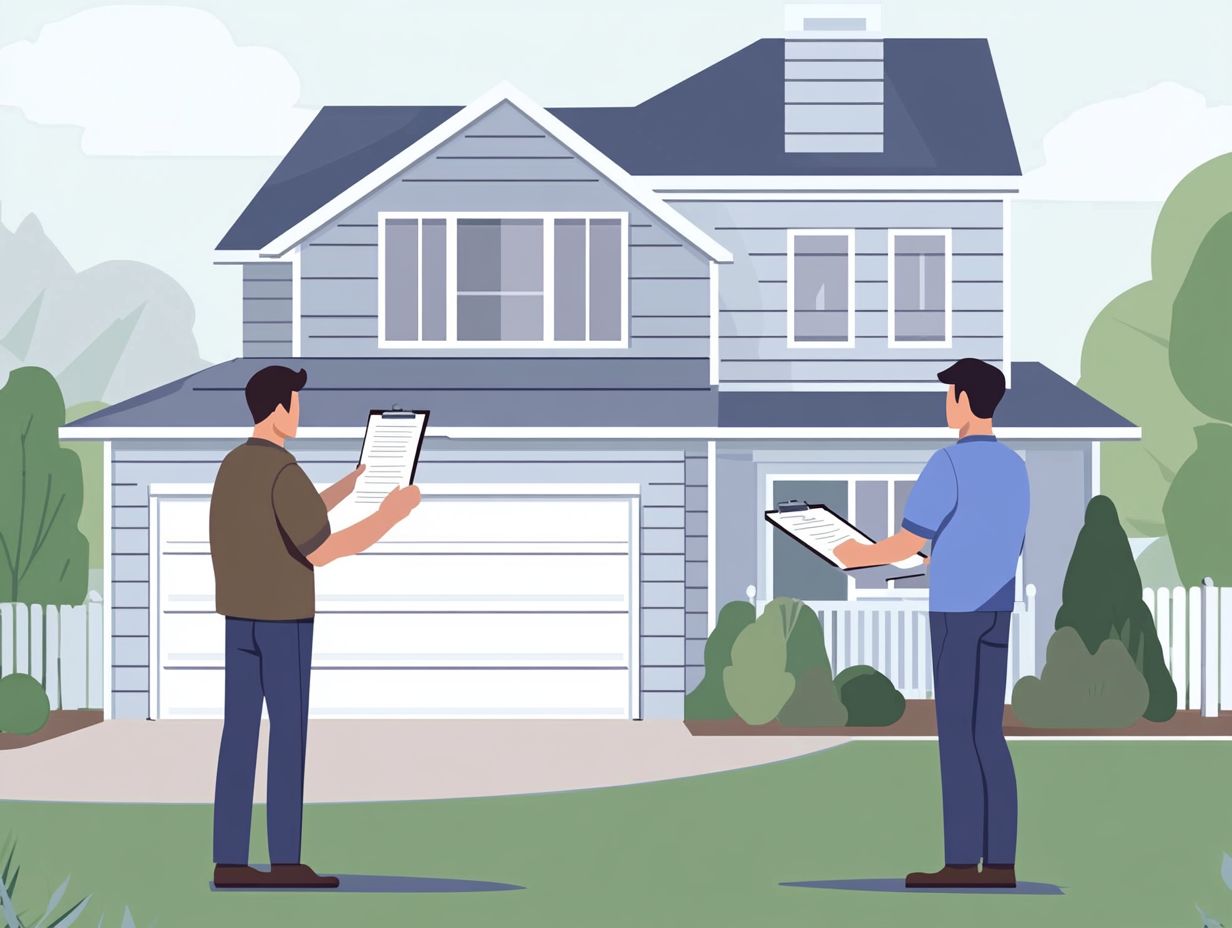
The cost of a home inspection can vary based on the size of the home, location, and additional services. On average, it can range from $300 to $500.
What type of training should a home inspector have?
A good home inspector should have extensive training in building codes, construction, and safety regulations. Additionally, when considering the process of buying a home, it’s vital to understand how to choose the right real estate agent for you. Look for certifications from reputable organizations like the International Association of Certified Home Inspectors (InterNACHI) or the American Society of Home Inspectors (ASHI).
Do I need to be present during the home inspection?
It is not required for you to be present, but it is highly recommended. Being there allows you to ask questions and address concerns directly with the inspector, providing a better understanding of the home’s condition.
What if the inspector finds problems with the home?
If the inspector finds any issues, discuss them with the inspector to get a detailed report. Depending on the severity, you may need to renegotiate the sale price or address the issues before proceeding with the purchase.
Can I choose my own home inspector or do I have to use the one recommended by my real estate agent?
You can choose your own home inspector or use one recommended by your real estate agent. However, it’s advisable to do your own research and choose the right inspector for your needs who you feel is unbiased and will provide a thorough assessment of the home.



